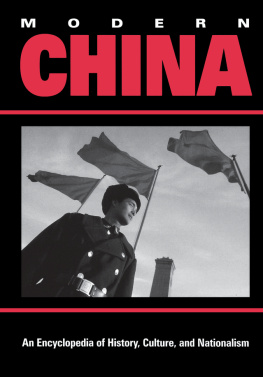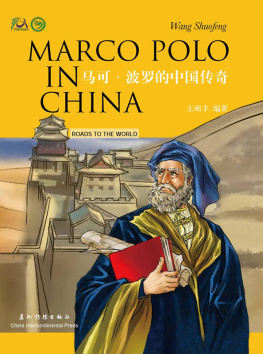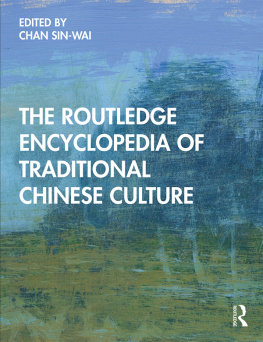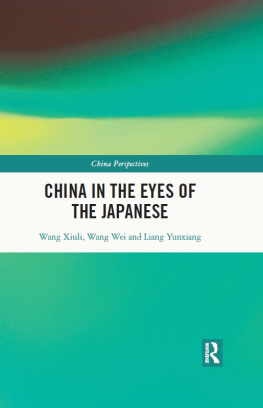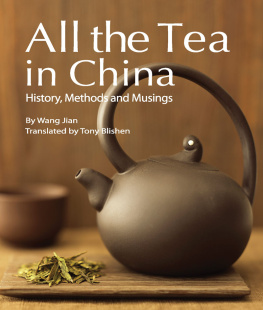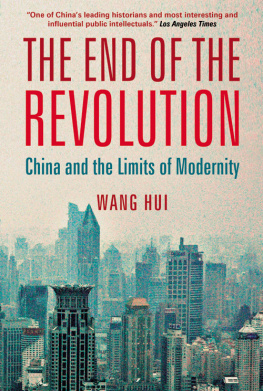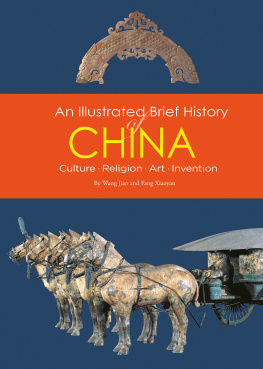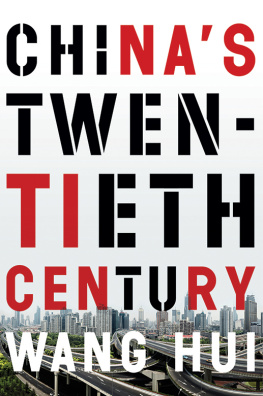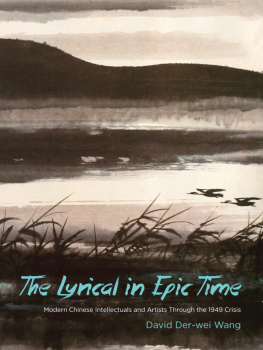Wang Ke-wen - Modern China: an encyclopedia of history, culture, and nationalism
Here you can read online Wang Ke-wen - Modern China: an encyclopedia of history, culture, and nationalism full text of the book (entire story) in english for free. Download pdf and epub, get meaning, cover and reviews about this ebook. City: New York;China, year: 1999, publisher: Routledge;Garland Pub, genre: Politics. Description of the work, (preface) as well as reviews are available. Best literature library LitArk.com created for fans of good reading and offers a wide selection of genres:
Romance novel
Science fiction
Adventure
Detective
Science
History
Home and family
Prose
Art
Politics
Computer
Non-fiction
Religion
Business
Children
Humor
Choose a favorite category and find really read worthwhile books. Enjoy immersion in the world of imagination, feel the emotions of the characters or learn something new for yourself, make an fascinating discovery.
- Book:Modern China: an encyclopedia of history, culture, and nationalism
- Author:
- Publisher:Routledge;Garland Pub
- Genre:
- Year:1999
- City:New York;China
- Rating:4 / 5
- Favourites:Add to favourites
- Your mark:
- 80
- 1
- 2
- 3
- 4
- 5
Modern China: an encyclopedia of history, culture, and nationalism: summary, description and annotation
We offer to read an annotation, description, summary or preface (depends on what the author of the book "Modern China: an encyclopedia of history, culture, and nationalism" wrote himself). If you haven't found the necessary information about the book — write in the comments, we will try to find it.
Wang Ke-wen: author's other books
Who wrote Modern China: an encyclopedia of history, culture, and nationalism? Find out the surname, the name of the author of the book and a list of all author's works by series.
Modern China: an encyclopedia of history, culture, and nationalism — read online for free the complete book (whole text) full work
Below is the text of the book, divided by pages. System saving the place of the last page read, allows you to conveniently read the book "Modern China: an encyclopedia of history, culture, and nationalism" online for free, without having to search again every time where you left off. Put a bookmark, and you can go to the page where you finished reading at any time.
Font size:
Interval:
Bookmark:

Modern China
GARLAND REFERENCE LIBRARY OF THE HUMANITIES VOLUME 1519
An Encyclopedia of History, Culture, and Nationalism
Editor
Wang Ke-wen
GARLAND PUBLISHING, INC.
A MEMBER OF THE TAYLOR & FRANCIS GROUP
New York & London
1998
Copyright 1998 Wang Ke-wen
All rights reserved
Library of Congress Cataloging-in-Publication Data
Modern China: An encyclopedia of history, culture, and nationalism / editor
Wang Ke-wen.
p. cm. (Garland reference library of the humanities:
vol. 1519)
Includes index.
ISBN 0-8153-0720-9 (alk. paper)
1. NationalismChinaHistory19th centuryEncyclopedias.
2. NationalismChinaHistory20th centuryEncyclopedias. I. Ke-wen,
Wang II. Series.
JC311.M54 1997
951' .003dc21
97-19299
CIP
Cover art: Photograph of Tiananmen Square, Beijing, China by Grant Faint, The Image Bank, NY.
Cover design: Robert Vankeirsbilck.
It has been said that every Chinese living in modern times was, or is, a nationalist. This statement at once reveals two notable characteristics of modern Chinese nationalism: its pervasive influence on the Chinese populace, and its lack of clarity as a concept when applied to the complex and changing Chinese realities. Since the emergence of foreign and domestic crises in the mid-nineteenth century, nearly all Chinese leaders have professed their desire to "save the country" (jiuguo), a desire that may be generally described as nationalistic. Jiuguo, however, has been cited to define, and defend, such a wide range of frequently contradictory intellectual or political stances in China that its meaning has become increasingly elusive.
Both Zeng Guofan and Hong Xiuquan, fighting on opposing sides during the Taiping Rebellion, claimed confidently to be nationalistic. So did the revolutionary Sun Yatsen and his monarchist opponents, Kang Youwei and Liang Qichao; or the May Fourth youth and their conservative cultural and political rivals; or Chiang Kaishek's Guomindang and Mao Zedong's Communists. A similar "patriotic" (aiguo) claim also predominated the self-portrayals of Yuan Shikai, Wang Jingwei, Zhang Xueliang, Deng Xiaoping, as well as those of the student demonstrators at Tiananmen Square in 1989. In their view, and in the eyes of their countrymen, nationalism is an idea so noble that its very evocation permits a positive assessment of the actions of its proponents, and so flexible that it can be tailored to justify almost any course of action.
Western scholarship on modern China reflects this omnipresenceand elusivenessof Chinese nationalism. Paul A. Cohen, for example, traced an "economic nationalism" in the thought of Wang Tao in the 1860s Lately, the cultural change brought about by post-Mao reforms has led some scholars to conclude that nationalism is replacing communism as the dominant ideology in contemporary China.
Historians have argued about the role that nationalist sentiment has played in various stages and aspects of modern China's development; yet they have seldom offered a clear definition as to what that sentiment was or is. To some extent, the confusion reflects the uncertainty the Chinese themselves had felt in grasping a relatively new concept. Nationalism, as a coherent ideology, did not take shape in China until the last decades of the nineteenth century. The conventional wisdom about Chinese nationalism has been that the universalist ideal of Confucianism, what Joseph R. Levenson called "culturalism," prevented the Chinese from developing a genuine nation As suggested by the term tianxia, or "all under the heaven," the traditional Chinese elite regarded its "celestial empire" as the most advanced, in fact the only, civilization in the world. This civilization it believed to be universally appealing and applicable, thus enjoying the potential to expand beyond the borders of China. Based on such a belief, imperial Chinese considered anyone who practiced a Confucian-based Chinese way of life as "Chinese," and any government that ruled China through Chinese institutions and ideas as a "Chinese government." They made no attempt to distinguish themselves from other peoples in a political-ethnic sense. According to the culturalism theory, this absence of a "national identity" in the traditional Chinese consciousness posed an immense obstacle for the Chinese when they wished to secure their place in the modern world of nation-states.
Other scholars have challenged this view. They argue that the Han people, the traditional residents of China proper, have long been aware of the ethnic distinction between themselves and the non-Han "barbarians." Although disguised by culturalist rhetoric, the Chinese in fact had traditionally defined their empire as a Han state. In times of strength and peace, the Confucian elite often employed culturalist arguments to rationalize the outward expansions of the empire; when facing external threat, it quickly retreated to the ethnic views that the masses had always held. This pattern, proponents of the Han nationalism theory point out, was clearly demonstrated in the Han loyalist movements during the Mongol and Manchu conquests of China. Recently James Townsend, trying to bridge the two opposing views, pointed out that culturalism itself may be regarded as a form of nationalism because it attempted to define Chinese ethnicity by asserting the culturaland even politicaldistinctions between the (Han) Chinese and others.
The above debate, still unresolved, only highlights the extent of China's identity crisis in the modern era, when both Han nationalism and Confucian culturalism were faced with serious challenges. By the mid-nineteenth century, China had been under the "alien rule" of the Manchus for more than two hundred years. The discontent of the Han Chinese had motivated several major disturbances, notably the Taiping Rebellion of the 1850s and 1860s, but they were effectively suppressed by the Qing government. Western intrusion in the 1840s both confused and clarified the issue of Chinese nationalism. As the threat of the West, and later of Japan, became intensified, the Chinese for the first time accepted the notion of China as a member of the international community. That realization also convinced them of the need for all Chinese to unite against the foreign powers who attempted to deny China an international status equal to that of other countries.
The problem for the Chinese, however, was how to define the term "all Chinese." Most of the elite Chinese understood "Chinese" as the people being currently governed by the Qing empire. For the early reformers who came to realize the existence of a "family of nations," of which China was a member, there was no other way to define the identity and sovereignty of China but by recognizing the political legitimacy of the Qing. Yan Fu, who introduced a Social Darwinist world view to his fellow countrymen in the late nineteenth century, argued that supporting the existing Chinese state, i.e., the Qing, was necessary for the country's reform and survival.
In the meantime, the repeated failure of the Manchu court in resisting Western and Japanese assaults reinforced Han nationalism among other, mostly young, Chinese. The latter came to believe that the "non-Chinese (non-Han)" ethnic background made the Manchus unmotivated, and thereby unqualified, to protect the Chinese state. A necessary step in securing the survival of China was therefore to overthrow the Manchu rule and restore the country to the Han Chinese. Here, again, the Han nationalists, as those at the end of the Song and Ming dynasties, defined China as a Han state. And it was in this anti-Manchu discourse that they began to appreciate the Western notion of nation-state. They also adopted the Japanese terms minzu and minzu zhuyi to translate the Western concepts of "nation" and "nationalism."
Font size:
Interval:
Bookmark:
Similar books «Modern China: an encyclopedia of history, culture, and nationalism»
Look at similar books to Modern China: an encyclopedia of history, culture, and nationalism. We have selected literature similar in name and meaning in the hope of providing readers with more options to find new, interesting, not yet read works.
Discussion, reviews of the book Modern China: an encyclopedia of history, culture, and nationalism and just readers' own opinions. Leave your comments, write what you think about the work, its meaning or the main characters. Specify what exactly you liked and what you didn't like, and why you think so.

